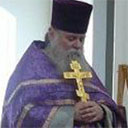“In giving birth you preserved your virginity! In falling asleep you did not forsake the world, 0 Theotokos!” (Troparion of the Dormition of the Theotokos)
In a climactic scene of the movie Star Wan, Obi-Wan Kenobi allows Darth Vader to kill him, so that his spirit can better aid his young disciple, Luke Skywalker. The episode, like the whole movie, carries with it a lot of New Age mumbo-jumbo, but it can illustrate a point about The place of the saints in our spiritual life.
The righteous are bound both to God and to the world by ties of love. Their lives even in this world rest on their love for God, realized in their union with the death and resurrection of Christ, and kindled and nourished by the Holy Spirit. This communion with God gives birth to a love for others, especially their brothers and sisters in the Church. Our Lord implied this two-way bond when He linked love of God and love of neighbor as the greatest commandments.
Concern for those who remain in the world is manifest in the lives of the saints. Even monastic hermits or recluses did not leave society because of their hatred of others. Rather, they withdrew because they could not live among its temptations and still achieve the union with God to which they were called and which they so fervently desired. They continued, however, to grieve for the sins of the brethren they left behind, to yearn for our salvation, and to intercede for our redemption as well as their own. Many withdrew only to return to the world later, offering the spiritual insight, gained in solitude, to others who sought the Kingdom of God.
Similarly, when the saints depart the world in death, they do not abandon it. They remain joined particularly with those who, like them, “have put on Christ” through communion with Him in the sacraments and who draw strength from His grace to endure and triumph in spiritual struggle. Thus, in the grace of Christ, the saints abide always with us, and we benefit from their prayers and their help in time of need.
This is especially true of the greatest of the saints, the Theotokos and ever-Virgin Mary. In the troparion of the feast of her Dormition we sing, In falling asleep you did not forsake the world. We remember that her earthly life has come to an end, yet she has not abandoned the world or her brothers and sisters in the Church. To put it another way, Christ has presented her to us as an intercessor, a help, and an example. And, indeed, her intercession is all the more powerful and her love all the more manifest for her physical absence.
The troparion compares her falling asleep with her divine maternity: In giving birth you preserved your virginity! The hymn thus reminds us that Christ reconciles what sin has broken Sin divides what should be whole and separates what should be united. The words “health” and “whole” come from the same root. Sin leads to spiritual dysfunction, as Saint Maximus the Confessor points out; it disrupts the harmony between our personal will and our natural will, which reflects the divine will and derives from the image of God within us. We become “of two minds,” at war with ourselves, stretched and twisted as we vainly endeavor simultaneously to grow toward God and to plunge ourselves in sin.
Christ restores spiritual health by restoring unity. We see this illustrated in the Virgin. By His incarnation through her the Lord reconciles apparent contradictions. She can give birth to a human child without disrupting her spiritual union with the heavenly Bridegroom. She can leave the world and by that leaving draw us closer to her. Knowing the depth of her love for Him, God chose her for the supreme service, to be the vehicle of His incarnation by which salvation came to her and to all of us, her brothers and sisters. Her death was likewise a gift to her from her divine Son, an invitation to a new ministry.
Since her falling asleep, countless Orthodox Christian have experienced her love. We have seen it confirmed in numerous healings and other miracles. We have known the blessing of her prayers and intercessions. We have been encouraged by her example of quiet, humble obedience and full, confident faith. Truly we know that neither she nor the other saints have abandoned the world: we see in our own lives the evidences of their love, which merely reflects to the love of Christ.
In the fictional movie a warrior-mystic dies so that he may better guide his disciple through some mythical “force”. In real life the Theotokos and tile saints relinquish the world so that they may be with Christ and, thereby, better serve both Him and us as instruments of His grace and power.
***


